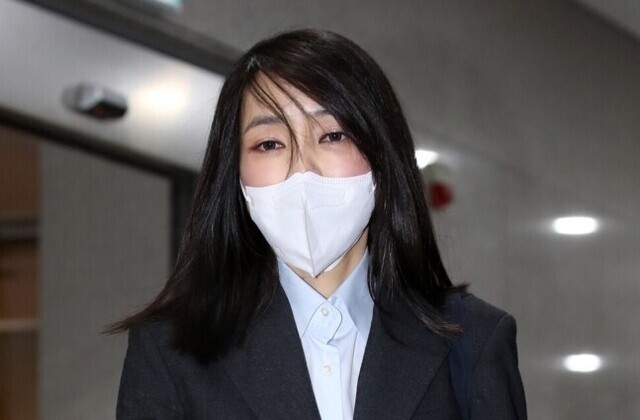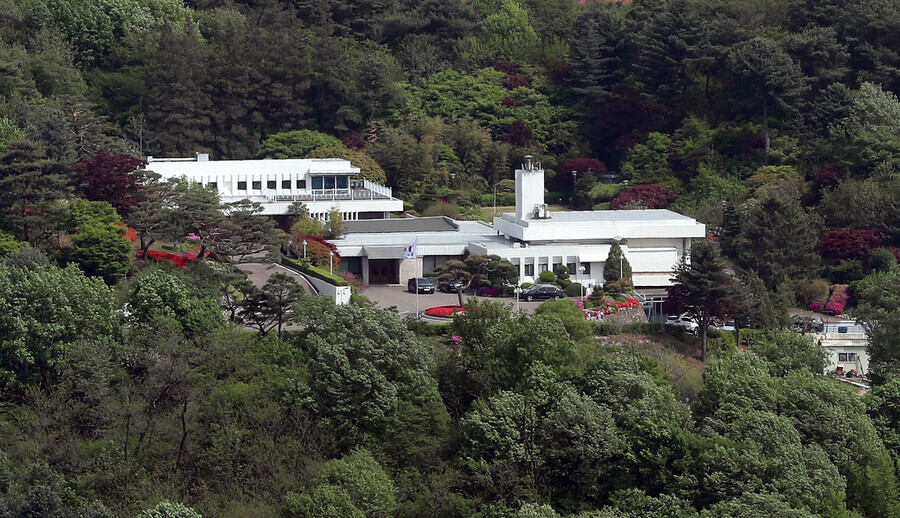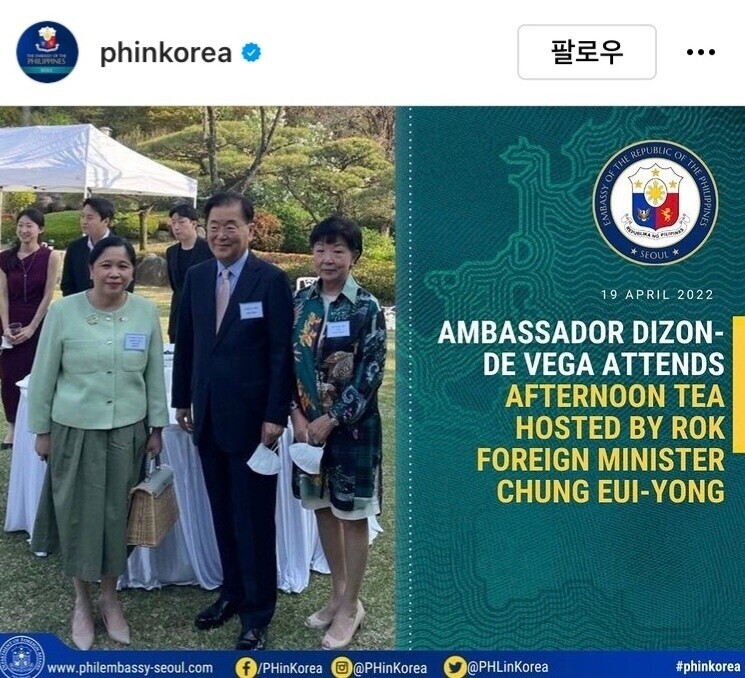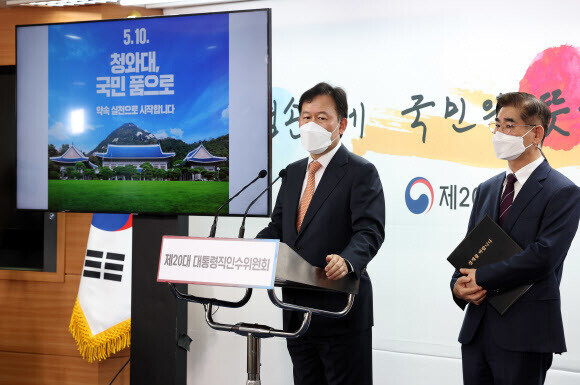hankyoreh
Links to other country sites 다른 나라 사이트 링크
[News analysis] What’s really motivating Yoon to move into the foreign minister’s residence?

The process of discussing, deciding, and announcing the new presidential residence by President-elect Yoon Suk-yeol’s so-called Blue House relocation task force has been mired in secrecy and unilateral decisions. The most recent controversy arose when Yoon’s wife reportedly visited the official residence of the foreign minister, which some say had a “decisive impact” on Yoon’s decision to make that his residence instead of the Army chief of staff residence that had been decided on previously.
According to coverage by the Hankyoreh on Monday, Yoon’s wife Kim Keon-hee toured the foreign minister’s residence on April 16 or 17. Then, on April 19, Yoon’s camp reportedly asked Foreign Minister Chung Eui-yong if Yoon could visit the foreign minister’s official residence to see it for himself.
It was late that evening when the first reports started coming regarding Yoon’s consideration of the foreign ministry residence as his presidential residence.
According to Yoon’s transition team, the decision was inevitable given the poor and old condition the Army chief of staff's residence was in.
On April 20, a transition team official said that the foreign minister’s residence was “the most reasonable alternative” for the presidential residence. Four days later, Yoon’s spokesperson Bae Hyun-jin said during a briefing that the decision had officially been made. The final announcement confirming the decision came on Monday during a press briefing held by Yoon’s Blue House relocation task force.

What is noteworthy, however, is that prior to Kim's visit to the foreign minister’s residence, it was not known at all that the residence was being (strongly) considered as an option for Yoon’s presidential residence.
The news also came as a shock to the Ministry of Foreign Affairs, who now found themselves having to scramble last-minute to accommodate Yoon’s wishes. The foreign minister’s residence had been a key diplomatic asset of the Ministry of Foreign Affairs for more than half a century since its completion in January 1970.
The ministry was not consulted beforehand and reportedly learned of Yoon’s decision to move to the residence on April 24, when Yoon’s spokesperson announced the decision had “in effect” already been made.
According to the Hankyoreh’s coverage, Yoon’s wife spent that weekend looking around every nook and cranny of the foreign minister's residence, including the current living space of the minister and his wife, reportedly saying, “I like this place.” While looking around the gardens, Kim is also said to have pointed out that she would have to cut down a tree since it was obscuring the nice scenery of Mount Nam.
A few days later, on April 19, Yoon’s transition team asked Chung if the president-elect could go see the place himself. At the time, however, Chung had invited a number of diplomatic envoys to his residence, including ambassadors from the Association of Southeast Asian Nations (ASEAN), to privately discuss issues of common interest and diplomacy behind closed doors.
Chung’s representatives said that any visit by Yoon that day would be difficult given the schedule of the minister, to which Yoon’s side replied they would visit when the next opportunity arose.
This differs from the Hankyoreh’s coverage on April 23 which stated that Yoon also visited the residence a few days after his wife visited the foreign minister’s residence in the Hannam neighborhood. However, even though Yoon’s task force denies these claims, it is difficult to know what exactly the full truth is.

Initially, the presidential office relocation task force pointed to the Army chief of staff’s residence as the new presidential residence on March 20, when Yoon himself announced that he would move his office from the Blue House to the Defense Ministry compound in Yongsan. At the time, the relocation task force did mention the foreign minister’s residence as being in contention, but they clearly told reporters they preferred president-elect Yoon to move to an empty house, not one where the elected official was still residing.
However, roughly a month later, the transition team officially announced that it would use the foreign minister's official residence as the presidential residence. There was no prior notice to the Foreign Ministry, which now has to now procure a new abode for its minister.
Related to this, reporters asked a transition team official during an anonymous briefing on Sunday if there had been no prior consultations with the Ministry of Foreign Affairs, since the ministry had expressed being flustered.
“I don't think it's a matter of reaching an agreement with the Foreign Ministry,” the official answered, adding that “I don't think we need to respond to the ministry's reaction.”
Critics say that the presidential residence is not merely the private home of Yoon and his wife, but a symbolic and public place, and that Yoon’s behavior was very inappropriate in light of the fundamental spirit of the democratic constitutional system that must ensure the continuity and transparency of state affairs.

Earlier, at the request of the transition committee, the Moon Jae-in administration held an ad hoc Cabinet meeting presided over by Prime Minister Kim Boo-kyum on April 6 and decided on a reserve of 36 billion won (US$28.5 million) for the relocation of the presidential office. The budget also includes 2.5 billion won for the renovation of the residence of the Army chief of staff, which Yoon’s team had initially chosen for the presidential residence. However, it’s worth noting here that it is illegal to use reserve funds for any purposes other than what they were specified for, in accordance with the National Finance Act.
In other words, the reserve fund of 2.5 billion won set aside for the renovation of the Army chief of staff’s residence cannot be used for the renovation of the foreign minister's residence. Therefore, the budget for the renovation of the foreign minister's residence can only be raised when a Cabinet meeting is held after the inauguration of the Yoon administration on May 10.
Yoon Han-hong, head of the relocation task force, also seems to be aware of this fact. At a press conference held Monday, he said, “The foreign minister's official residence is being used by the minister now, so we can only touch it after May 10.”
His comments, however, may be more linked to issues regarding the National Finance Act rather than out of consideration for the current foreign minister.
By Lee Je-hun, senior staff writer
Please direct questions or comments to [english@hani.co.kr]

Editorial・opinion
![[Guest essay] Preventing Korean Peninsula from becoming front line of new cold war [Guest essay] Preventing Korean Peninsula from becoming front line of new cold war](https://flexible.img.hani.co.kr/flexible/normal/500/300/imgdb/original/2024/0507/7217150679227807.jpg) [Guest essay] Preventing Korean Peninsula from becoming front line of new cold war
[Guest essay] Preventing Korean Peninsula from becoming front line of new cold war![[Column] The state is back — but is it in business? [Column] The state is back — but is it in business?](https://flexible.img.hani.co.kr/flexible/normal/500/300/imgdb/original/2024/0506/8217149564092725.jpg) [Column] The state is back — but is it in business?
[Column] The state is back — but is it in business?- [Column] Life on our Trisolaris
- [Editorial] Penalties for airing allegations against Korea’s first lady endanger free press
- [Editorial] Yoon must halt procurement of SM-3 interceptor missiles
- [Guest essay] Maybe Korea’s rapid population decline is an opportunity, not a crisis
- [Column] Can Yoon steer diplomacy with Russia, China back on track?
- [Column] Season 2 of special prosecutor probe may be coming to Korea soon
- [Column] Park Geun-hye déjà vu in Yoon Suk-yeol
- [Editorial] New weight of N. Korea’s nuclear threats makes dialogue all the more urgent
Most viewed articles
- 1[Guest essay] Preventing Korean Peninsula from becoming front line of new cold war
- 2After 2 years in office, Yoon’s promises of fairness, common sense ring hollow
- 360% of young Koreans see no need to have kids after marriage
- 4Yoon’s broken-compass diplomacy is steering Korea into serving US, Japanese interests
- 5[Column] Why Korea’s hard right is fated to lose
- 6S. Korean first lady likely to face questioning by prosecutors over Dior handbag scandal
- 7[News analysis] Jo Song-gil’s defection and its potential impact on inter-Korean relations
- 811 years after US decamped, military base in Busan still festering with pollution
- 9[Editorial] The ideals of the Korean Provisional Government are still threatened today
- 10[Column] “Hoesik” as ritual of hierarchical obedience